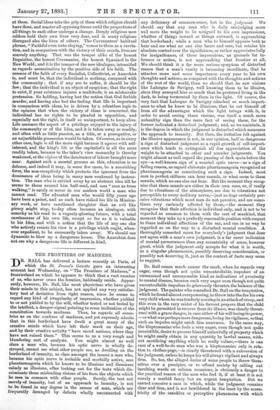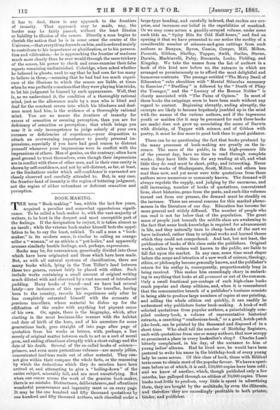THE FRONTIERS OF MADNESS.
DR. BALL has delivered a lecture recently at Paris, of which the St. James's Gazette gave an interesting account last Wednesday, on "The Frontiers of Madness," a frontierland on which he appears to think that a vast number of us, who never cross the frontier, habitually reside. Appar- ently, however, Dr. Ball, like most physicians who have given their minds to this subject, has not applied any very satisfac- tory test of deviation from right reason, since he seems to regard any kind of irregularity of impression, whether yielded to or not yielded to by the will, whether tested or not tested by the intellect, a danger-signal pointing to some inclination of the constitution towards madness. Thus, he regards all eccen- trics as on the confines of madness, and yet expressly admits that in this borderland have dwelt a great many of the creative minds which have left their mark on their age, and by their creative activity "have saved nations, where they have not rained them." This seems to us a very rough and blundering sort of analysis. You might almost as well class a man who, because his optic nerve is wholly de- stroyed, cannot see what other people see, as dwelling on the borderland of insanity, as class amongst the insane a man who, because his optic nerve is irritable and morbidly active, sees phantasmagoria which he knows to be illusions and dismisses calmly as illusions, after looking out for the tests which dis- criminate these misleading visions of his from the objects which
he sees in common with other, people. Surely, the test not merely of insanity, but of an approach to insanity, is not to be found in any degree in the senses of man, which are frequently deranged by defects wholly unconnected with
any deficiency of common-sense, but in the judgment. We should say that any man who is daily misjudging more and more the weight to be assigned to his own impressions, whether of things inward or things outward, is approaching that borderland; while a man who to himself appears both to hear and see what no one else hears and sees, but retains his absolute control over the significance, or rather appreciates fully the insignificance, of these impressions, as grounds for in- ference or action, is not approaching that frontier at all. We should think it a far more serious symptom of disturbed reason that a man's vanity is becoming inordinate, that he attaches more and more importance every year to his own thoughts and actions, as compared with the thoughts and actions of the rest of the world, than we should that he saw visions like Lalorgne de Savigny, well knowing them to be illusive, since they annoyed him so much that he preferred living in the dark, to being tormented by them in the light. Of course, the very fact that Lalorgne de Savigny attached so much import- ance to what he knew to be illusions, that he cut himself off from all the advantages which the light brings with it, in order to avoid seeing these visions, was itself a much more unhealthy sign than the mere fact of seeing them, for the former indicated a disturbed judgment; and, as we maintain, it is the degree in which the judgment is disturbed which measures the approach to insanity. But then, the irritation felt against the illusive appearance is not, in our opinion, half so dangerous a sign of disturbed judgment as a rapid growth of self-import- ance which tends to extinguish all due appreciation of the weight to be attached to other and sounder judgments. You might almost as well regard the passing of dark spots before the eye—a well-known sign of a wearied optic nerve—as a sign of failing reason, as regard elaborate phantasmagoria recognised as phantasmagoria ' as constituting such a sign. Indeed, most men in perfect stillness can hear sounds, or what seem to them sounds, which no one else can hear. But the moment they recog- nise that these sounds are either in their own ears, or, if really due to vibrations of the atmosphere, are due to vibrations not perceptible to every auditory nerve,—just as dogs certainly per- ceive vibrations which most men do not perceive, and are some- times very curiously affected by them,—the moment they recognise that their affection is individual only, and is not to be regarded as common to them with the rest of mankind, that moment they take up a perfectly reasonable position with respect to these individual affections of the ear, and can in no way be regarded as on the way to a disturbed mental condition. A thoroughly conceited scorn for everybody's judgment that does not agree with a man's own judgment, is a far wirer indication of mental perverseness than any eccentricity of sense, however great, which the judgment only accepts for what it is worth, as a singular phenomenon, possibly deserving consideration, or possibly not deserving it, just as the context of facts may seem to suggest.
Dr. Ball comes much nearer the mark, when he regards very eager, even though not quite uncontrollable, impulses of an unreasoned and unreasonable kind as indications of proximity to mental disease, because such very eager even though not quite uncontrollable impulses do grievously threaten the balance of the judgment. The painter who consulted Dr. Ball on the temptation, which he found almost overpowering, to throw into the fire his own very child whom he was tenderly nursing in an attack of croup, and this even in the very midst of his fervent prayers that the child might be permitted to recover from its illness, was clearly threat- ened with a grave danger, in case either of his will losing its power, —or what was perhaps more dangerous, losing its vigilance, so that such an impulse might catch him unawares. In the same way, the kleptomaniac who feels a very eager, even though 'not quite irresistible, desire to possess himself unlawfully of property which he might easily obtain in any quantity by lawful means, with- out sacrificing anything which he really values,—there is one case of a well-to-do man who was a kleptomaniac only in rela- tion to clothes-pegs,—is clearly threatened with a subversion of his judgment, unless he keeps his will always vigilant and always firm. So, too, the alleged desire of some people to throw them- selves over a precipice, or to offend society by calling out insulting words on solemn occasions, is obviously a danger to the practical reason of the men who feel it, if at least it is not merely a morbid fancy but an urgent temptation. But we cannot conceive a case in which, while the judgment remains clear and firm, and is not bewildered in the least by the eccen- tricity of the sensitive or perceptive phenomena with which
it has to deal, there is any approach to the frontiers of insanity. That approach may be made, nay, the border may be fairly passed, without the least illusion or liability to illusion of the senses. Directly a man begins to cherish the notion that he is in some, sense the centre of the Universe,—that everything depends on him, and is ordered mainly to contribute to his importance or glorification, or to his persecu- tion and vilification,—he is approaching the frontier of madness much more closely than he ever would through the mere trickery of the senses, his power to check and cross-examine their false reports remaining undiminished. Coleridge, when asked whether he believed in ghosts, used to say that he had seen far too many to believe in them,—meaning that he had had too much experi- ence of the illusions to which the senses are liable, at times when he was perfectly conscious that they were playing him tricks, to let his judgment be biassed by such appearances. Well, that is, as we understand it, the condition of a thoroughly rational mind, just as the allowance made by a man who is blind and deaf for the constant errors into which his blindness and deaf- ness must lead him, is the evidence of a thoroughly rational mind. You are . no nearer the frontiers of insanity for excess of sensation or seeming perception, than you are for deficiency of sensation or perception; that which brings you near it is only incompetence to judge soberly of your own excesses or deficiencies of experience,—your disposition to attach an overweening importance to purely personal im- pressions, especially if you have had good reason to distrust yourself whenever your impressions were in conflict with the impressions of others. Men of genius, on the contrary, often have good ground to trust themselves, even though their impressions are in conflict with those of other men, and in their case sanity is shown by self-confidence, and not by self-distrust, so far, at least, as the limitations under which self-confidence'is warranted are closely observed and carefully attended to. But, in any case, the frontier-land of insanity is the region of tottering judgment, not the region of either redundant or deficient sensation and perception.







































 Previous page
Previous page